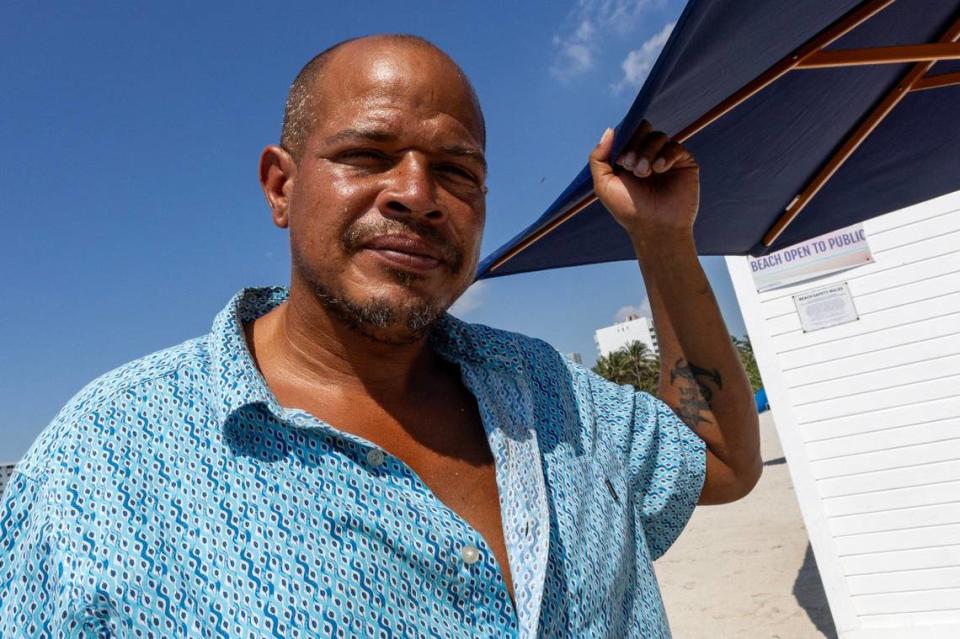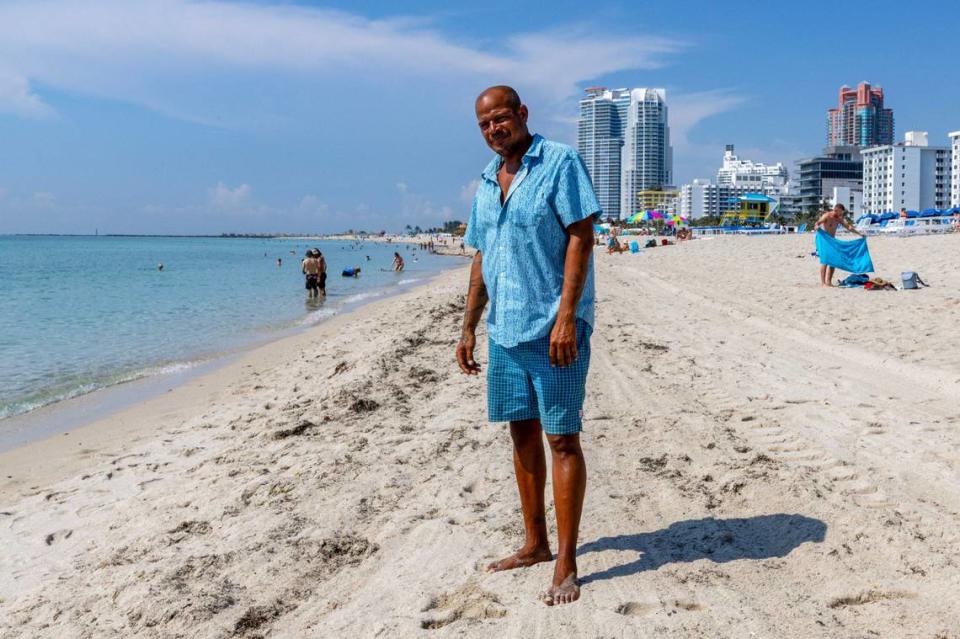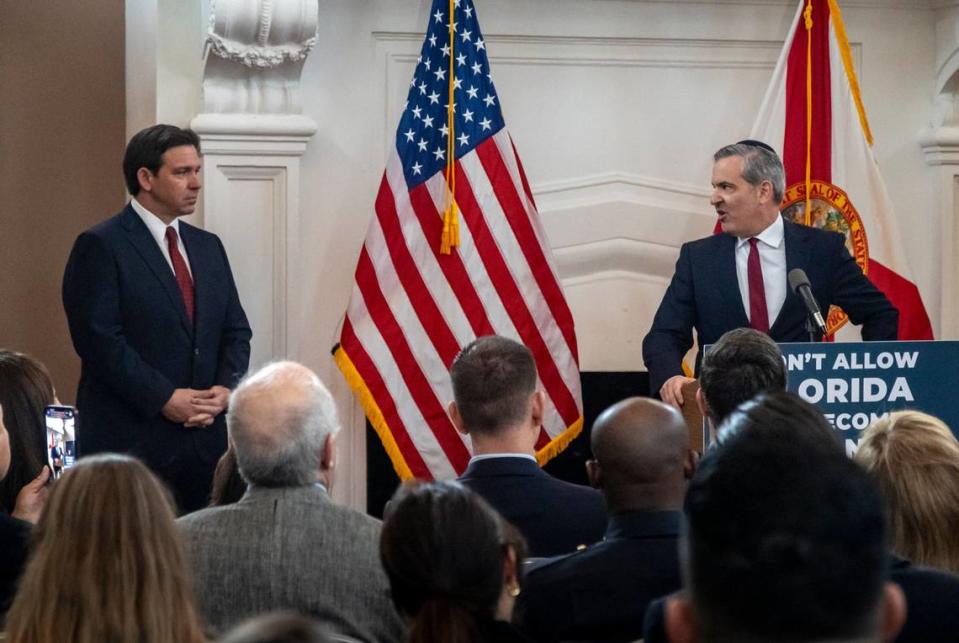‘It is inhumane’: Miami Beach ramps up enforcement of sleeping law aimed at homeless
Eugene “Gino” Gordon has been homeless in Miami Beach for about four years.
Each afternoon, Gordon, 45, attempts to scrape together some cash by throwing a small party on the sand in South Beach, selling wristbands to tourists and providing music and drinks. From midnight to 7 a.m., he works an informal security gig at a hotel restaurant on Ocean Drive. In exchange, the workers feed him breakfast.
During the hours in between, Gordon, a Chicago native, tries to get some sleep.
On Friday, May 3, Gordon dozed off on a beach chair near Fifth Street, covering himself with a sweater and an umbrella overhead. Shortly after 10 p.m., he was awoken by police officers and denied being homeless, according to a police report, telling the officers he didn’t want to be placed in a shelter.
Gordon was subsequently arrested on two city-ordinance violations: being in a park or beach after hours — the beach closes to the public at 10 p.m. — and “camping,” a law that Miami Beach officials strengthened in October to facilitate the arrest of homeless people who sleep outside and decline shelter placement.

Late last year, police arrested about 20 people under the revised camping law. But enforcement was sparse in the first few months of 2024 as public defenders and advocates questioned its application.
Now, amid growing pressure from elected officials to decrease the city’s unsheltered homeless population, camping arrests have again become common in recent weeks. Thirty-one people have been charged with the offense since April 26, according to police spokesperson Christopher Bess. Some were sleeping on the beach. Some were in public parks. Others were outside business doorways.
“Enforcement has intensified due to the completion of additional training sessions,” Bess said. “Officers have gained a greater comfort level in utilizing this tool as a result of discussions on the practical application of the ordinance during training.”
Bess said there have been “several documented instances of individuals accepting shelter before a camping arrest.”
But Gordon, who has been arrested about a dozen times since 2021, said it represents an escalation of the already harsh treatment of homeless people by Miami Beach police. In 2019, the Miami Herald reported that two-thirds of cases under a municipal prosecutor program aimed at addressing nuisance crimes involved homeless defendants. So far this year, about 35% of arrests in the city have been of people classified as homeless, according to city records.
“I don’t feel like homelessness is enough of a crime to arrest somebody and turn their life upside down,” Gordon said in an interview. “Everybody is one step away from being homeless.”
READ MORE: DeSantis praised a Miami Beach homeless law. Is it as ‘compassionate’ as the mayor says?
The change to the sleeping law last year came in response to resident complaints about the city’s homeless population and narrowly passed the City Commission despite concerns from advocates that it would effectively make unsheltered homelessness a crime. Gov. Ron DeSantis praised the city law at a March press conference in Miami Beach as he signed legislation seeking to prevent outdoor sleeping statewide.
Miami Beach Mayor Steven Meiner touted the ordinance as a “compassionate” approach and a form of “tough love,” giving people an opportunity to enter a shelter.
But Gordon — who said he ended up on the street after a bag containing all of his identification was stolen, preventing him from procuring housing — doesn’t see it that way.
“It is inhumane,” Gordon said, adding that Miami Beach police “love to arrest people that are homeless. I have seen them pass by tourists on the beach [after hours] and come to me because they know me.”
In response, Bess, the police spokesperson, said Gordon has “repeatedly disregarded warnings to refrain from engaging in vending activities in specified areas of the Beach.”

Gordon has previously faced charges that include trespassing, cannabis possession and “possession of untaxed beverages.” Last year, he was arrested on a charge of misdemeanor battery, a case that resulted in a withhold of adjudication. Records show that none of the arrests led to convictions.
Things are only getting harder for homeless people, Gordon said. In addition to enforcing the camping law, police have been targeting unauthorized food and beverage sales by backpack vendors on the beach, a priority of the City Commission in recent months.
“It has made it a lot more difficult for people to be able to make a halfway living for themselves,” Gordon said.

‘I’m not doing anything wrong’
Miami Beach’s homeless population was counted at 154 people in January, a 34% decrease from a year prior, according to the Miami-Dade Homeless Trust.
On Wednesday, several unhoused people in Miami Beach told the Miami Herald they understand the challenge that city officials face in trying to cater to residents and tourists and keep them safe, particularly given the mental-health and addiction struggles within the homeless population. But they also said it’s unfair for police to target those who are simply trying to get back on their feet.
Jorge, 36, who declined to provide his last name, said he became homeless about a month ago after losing a job as a chef in Miami Lakes and sending his remaining money to family in Venezuela. He said he has yet to be arrested but only because he has been careful about where he sleeps, doing his best to blend in with tourists.
“I’m not doing anything wrong,” he said in Spanish. “All these people are trying to do is get a job, get ahead and move on.”
On Lincoln Road, a man who identified himself as “Buddha” acknowledged that he sells drugs in Miami Beach and said he has been arrested dozens of times since 2016. He said he obtained a Realtor license in an effort to get off the street but has recently found himself homeless for a third time.
The man said he has made use of homeless-outreach services that the city offers. They include helping secure bus tickets and food stamps. But he said it’s “getting really hard” to be homeless in Miami Beach. In addition to the outdoor sleeping law, he pointed to a recent move by commissioners to deactivate electrical outlets on Lincoln Road to try to prevent unhoused people from being able to charge their phones.
Elected officials have been clear that making it more difficult to be homeless in the city is their intent.
“We want to discourage camping and sleeping in public places,” Commissioner David Suarez said during a January discussion about the electrical outlets.
Commissioner Joseph Magazine added during the discussion that there is a “clear correlation” between “cities that provide incentives and make it easy to be homeless and the amount of homeless [people] that they attract.”
“Our residents have been loud and clear that we are a compassionate city, but allowing people to just charge their iPhones to live out on Lincoln Road is not the type of city that we want to be,” he said.
Miami Beach City Commission approves $64,000 for "electronic timers" to deactivate electrical outlets on Lincoln Road so homeless people can't use them to charge their phones. Outlets will be deactivated except when restaurants are using them.
Details: https://t.co/23lk0vzEA0— Aaron Leibowitz (@aaron_leib) April 3, 2024
Miami Beach officials have sought to justify the camping ordinance by trumpeting $2.7 million in the city budget for a team of caseworkers and a walk-in center for the homeless population. And they have argued that, if a shelter bed is available but not accepted, arrest is an appropriate alternative. (Miami Beach does not have any shelter beds but has designated beds at facilities in the city of Miami.)
After last month’s killing of a homeless transgender woman, Andrea Doria Dos Passos, while she slept outside the Miami City Ballet, City Commissioner Alex Fernandez told the Miami Herald the goal of the camping ordinance is “to get vulnerable individuals like Andrea into a safe space.”
But some say shelter conditions — coupled with a lack of long-term affordable housing — can make the streets feel like their best option. The man on Lincoln Road said he stayed in a Miami shelter one night and found it “horrible.”
“It was worse than outside,” he said.
Gordon has never stayed in a shelter, he said, because he doesn’t believe it would be safe.
“I will not go because I see the people that come from the shelters,” he said. “They come out looking more stressed than when they went in.”
On May 24 around 11 p.m., Gordon faced another arrest for lying on the sand in South Beach. He was charged with trespassing after a warning — based on his arrest three weeks earlier — and with entering a park after hours. Gordon pleaded not guilty, as he did in the camping case. Both cases are pending.
As he continues to live outdoors, Gordon said he knows the cycle of being arrested and released is likely to continue.
“It is a revolving door that will continue to spin,” he said.
Miami Herald photographer D.A. Varela contributed to this report.


